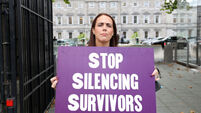Gender-based violence survivors call for reform of Ireland's 'barbaric' legal system

Paula Doyle speaking at the press conference on Tuesday at Buswells Hotel in Dublin as she and other survivors of gender-based and sexual violence called for reform of Ireland's 'barbaric legal system'. Picture: Stephen Collins/Collins
After her case was adjourned for a second time, sexual violence survivor Paula Doyle was at such a low point, she could not see to the next morning, never mind the new trial date.
But still, she found the strength to reach out.













